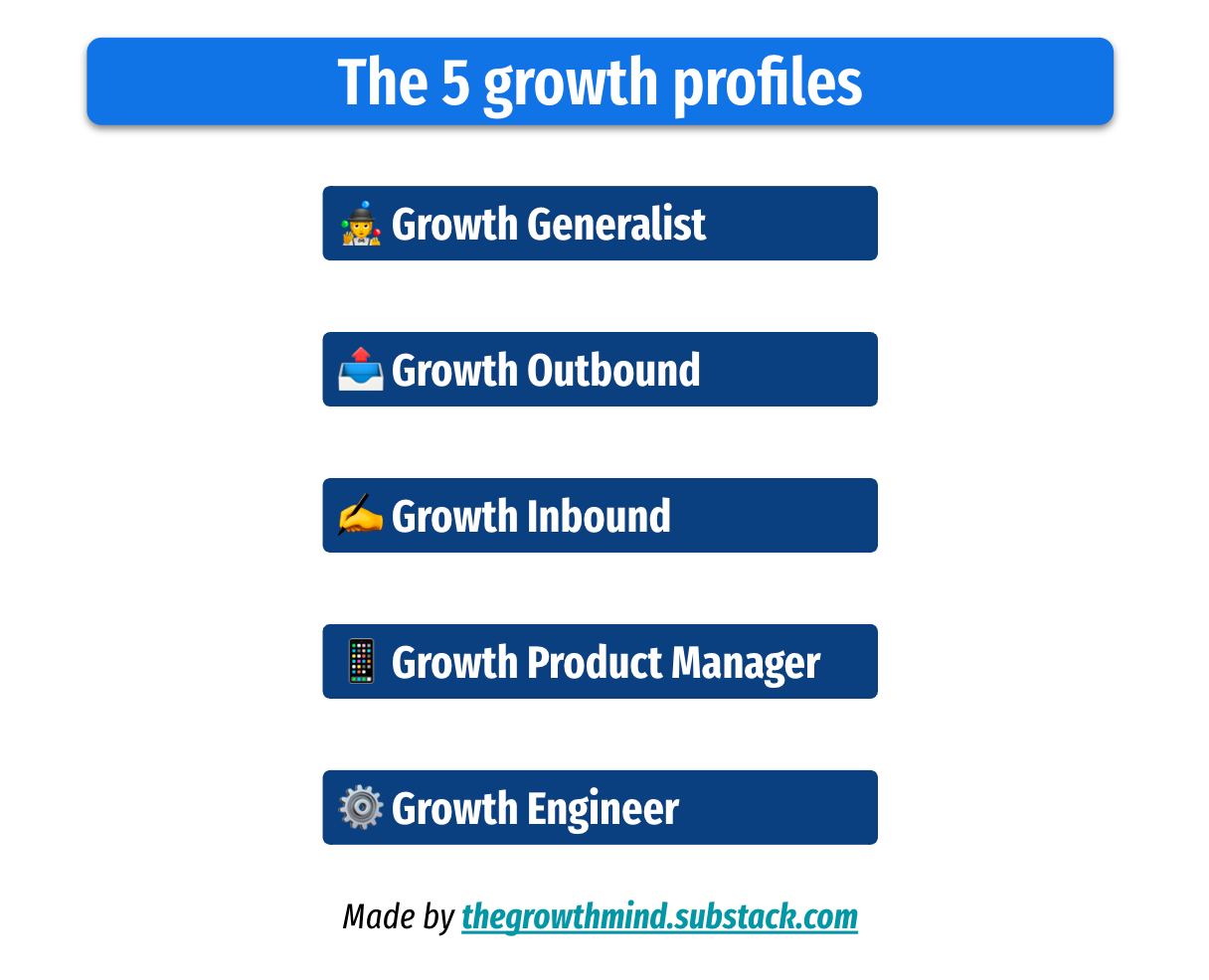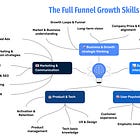👋 Hi there, it’s Pierre-Jean. Welcome to this new edition of The Growth Mind!
Every 2 weeks, I share Growth strategies inspired by the world’s leading scale-ups. To help you build outstanding Growth knowledge.
⏱️ Reading time = 5 minutes
Growth jobs have been rising a lot in recent years.
But we still struggle to define exactly what is the job of Growth people.
I’ve discussed with many people working in Growth in the recent years, from early-stage startups to big scale-ups, in B2C or B2B. Some interesting patterns I noticed:
80% of the time, Growth = Acquisition only. Growth jobs are, in their vast majority, lead generation, B2B outbound, or paid acquisition jobs.
In the other 20%, we either find people working on the whole funnel, from acquisition to revenue, or some specialized people working on a few parts of the funnel related to the product like activation or retention.
→ In reality, 2 jobs called “Growth Manager” can be very different.
And that’s a big problem for people who want to work in this field:
What skills do you need to perform?
Which team will you be part of?
Which part of the funnel will you focus on?
What is the ideal formation to work in growth?
In today’s edition of The Growth Mind, we break down the 5 main Growth job types.
For each job, we’ll analyze the main objective of the role, funnel focus, missions, channels driving growth, hard skills and soft skills.
So you’ll have the keys to fully understanding a Growth job and challenging the company hiring for it.
🤹 Growth Generalist - Full Funnel
The growth generalist is a profile who’s very present in early-stage product startups. But also in scale-ups, where he can work as a Growth project manager, working with a bunch of different teams.
Main Objective: Drive growth over the whole funnel by leveraging multiple channels and tactics.
Funnel Focus: The entire customer journey: acquisition, activation retention, referral, revenue. It means the Growth generalist can work on both Marketing & Product topics.
Channels: Potentially all channels, from marketing channels like SEO, Paid Ads, Outbound, to Product channels like in-app communications, CRM…
Missions: Analyze data to find growth opportunities, craft business cases, build campaigns, simplify processes, establish growth metrics, and experiment with growth tactics.
Hard Skills: Data Analysis, SEO, Content Marketing, Email Marketing, Paid Ads, Product Knowledge, Programming Basics.
Soft Skills: Creativity, Strategic Thinking, Problem-solving, Adaptability.
If you don’t want to specialize and keep a clear overview of the whole funnel, this is the role to go for.
This role is the closest to what we generally call a “T-shaped” Growth. Someone who has complete growth knowledge but is an expert in one or two channels.
If you want to deep dive into the skills needed for this role, I’ve written an article on it 👇
📤 Growth Outbound
This role is probably the most represented in the startup ecosystem.
In many companies, growth people's role is to generate leads for the sales team.
Main Objective: Feed the sales team with leads.
Funnel Focus: Acquisition.
Channels: Email Marketing, Cold Outreach (Email, LinkedIn…), Paid Ads.
Missions: Generate and nurture leads with outbound sequences, build relationships with potential customers, and facilitate CRM usage for the sales team.
Hard Skills: Copywriting, Cold Outreach, Sales Techniques, CRM Tools, Paid Advertising.
Soft Skills: Persistence, Communication, Negotiation, Persuasion.
This is a business-oriented role, focused on acquisition/lead generation.
It’s probably the role you’ll have the most chance to find, as a lot of companies rely on outbound yet.
But keep in mind that it keeps you away from product-related projects.
✍️ Growth Inbound/Content
As content as a growth channel is rising a lot since a few years, I bet we’ll see more and more of this profile in the coming years.
Main Objective: Increase organic user acquisition and engagement.
Funnel Focus: Acquisition, Activation, Engagement.
Channels: SEO, Social Media, Blogs, Podcasts.
Missions: Create engaging content on social media, implement SEO strategies to drive organic acquisition, and analyze content performance.
Hard Skills: Copywriting, Video Editing, Design, SEO, Social Media Management, Data Analysis.
Soft Skills: Communication, Empathy, Creativity, Patience, Writing Skills.
With a lot of different content types (text, video, audio…), a Growth Inbound/Content is not anymore a good copywriter only.
It’s someone who can also create and edit video and audio formats while having a good knowledge of SEO/ranking technics.
📱 Growth Product Manager
The role of Growth Product Manager is the only role of this list that’s focused only on product and not on marketing.
But his objective remains the same as the other jobs: drive growth. But instead of doing it through marketing tactics, he uses the product to do it.
Main Objective: Enhance product features to improve user acquisition, activation, and retention.
Funnel Focus: Acquisition, Activation, and Retention.
Channels: Product Features, Landing Pages, Onboarding Flows.
Missions: Collaborate with cross-functional teams, improve product metrics, build and analyze experiments.
Hard Skills: Product Management, Data Analysis, User Experience Design, Basic Programming.
Soft Skills: Strategic Thinking, Communication, User-Centricity.
With the rise of the product-led Growth model, we can expect that this role will explode in the coming years.
⚙️ Growth Engineer - Ops
Without a good engineer, driving growth can be difficult.
That’s why growth teams generally have an engineer working for them, or at least get bandwidth from engineering teams.
Main Objective: Build and automate growth-related features and tools.
Funnel Focus: Varies widely depending on the specific growth feature or tool being built.
Channels: Product Features, Process Automation, Data Tracking.
Missions: Implement growth experiments, build growth-related features and tools, automate processes, simplify data tracking.
Hard Skills: Programming, Automation, Data Analysis.
Soft Skills: Problem-Solving, Creativity, Attention to Detail.
With AI & No-code, it’s true that a lot of experiments, especially on top of the funnel, do not need an engineer. But when scaling and experimenting with your product, it’s more than essential to have engineering support.
Depending on how a company operates and how teams work, other growth jobs could of course exist. And one growth job can be very different between two companies depending on their channels, challenges, etc.
For example, B2B vs B2C can influence a lot a growth job missions and objectives.
But it’s crucial to fully understand what is behind a job desc before signing it.
And see which growth job best suits your profile.
That’s all for today! See you in 2 weeks for the next edition of The Growth Mind. 👋






Quite interesting to limit the scope and understand who's in charge of what! Thanks a lot PJ